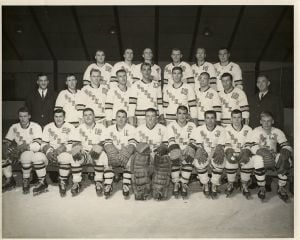Herb Brooks
Herbert Paul Brooks (August 5, 1937 – August 11, 2003) was an American ice hockey coach, best known for coaching the U.S. hockey team to a gold medal at the 1980 Winter Olympics in an event known as the Miracle on Ice. Herb's wife's name was Patty.
On November 13, 2006 Brooks was inducted into the Hockey Hall of Fame.[1]
Early life
Born in St. Paul, Minnesota he played on the Johnson High School hockey team that won the 1955 state hockey championship. Brooks later played hockey at the University of Minnesota and was a member of the 1964 and 1968 United States Olympic teams. He almost made the 1960 Olympic team, only to be cut the week before the Olympic games started. He then sat at home and watched the team he almost made win gold. Later, he coached the University of Minnesota Golden Gophers hockey team to three NCAA championships (1974, 1976, and 1979). He coached St. Cloud State University in the mid-1980s.
1980 Winter Olympics
The Soviet Union, which had won four consecutive Olympic titles from 1964 to 1976, was considered the best team at these Olympics, while the U.S. reaching the medal round was already considered a surprise. Brooks' coaching style during the buildup to the games is widely regarded as ingenious, as he made himself the unifying factor (as both the object of respect and ire) among his team full of former teammates and rivals. The victory later became known as the Miracle on Ice.
Later career
He was inducted into the United States Hockey Hall of Fame in 1990 and into the Hockey Hall of Fame in 2006.
Brooks later coached in the National Hockey League for the New York Rangers, where he became the fastest coach in Rangers' team history to win 100 games. He also coached the Minnesota North Stars, New Jersey Devils, and Pittsburgh Penguins. He was a long time head scout for the Pittsburgh Penguins from the mid-1990's until the day of his death.
He again coached the U.S. hockey team at the 2002 Winter Olympics, this time winning a silver medal. He also coached France in the 1998 Winter Olympics.
Death and Legacy
Brooks died in a one-car accident on the afternoon of August 11, 2003, near Forest Lake, MN on Interstate 35, only six days after he turned 66. It is believed that Brooks fell asleep behind the wheel before the accident after driving all night, and neither drugs nor alcohol were responsible.
Disney released a film about the 1980 Olympic team in 2004 called Miracle featuring Kurt Russell playing the part of Brooks. Brooks served as a consultant during principal photography, which was completed shortly before his death. At the end of the movie there is a dedication to Brooks. It states at the end, "He never saw it. He lived it."
Upon the 25th anniversary of the Miracle on Ice, the Olympic ice arena in Lake Placid, New York, where the United States won their gold medal, was renamed Herb Brooks Arena. A statue of Brooks depicting his reaction to the victory in the "Miracle" game was erected in Saint Paul, Minnesota in 2003.
In 2006, Brooks was chosen for induction to the Hockey Hall of Fame.
See also
- List of members of the United States Hockey Hall of Fame
External links

- Biography – The Herb Brooks Foundation
- Miracle (2004) – Movie Origins
- Coach known best for 1980 hockey gold – ESPN Classic
- Herb Brooks killed in car accident – Sports Illustrated
- Herb Brooks' U.S. Olympic Team bio
- Herb Brooks' Gravesite
- Gopher Hockey History Player Info
| Preceded by: Kevin Constantine |
Head Coach of the Pittsburgh Penguins 1999-00 |
Succeeded by: Ivan Hlinka |
| Preceded by: Tom McVie |
Head Coach of the New Jersey Devils 1992-93 |
Succeeded by: Jacques Lemaire |
Template:PensCoach
ReferencesISBN links support NWE through referral fees
- ↑ Roy tops 2006 Hall of Fame class. CBC.ca/Sports Online (June 28, 2006). Retrieved June 28, 2006.
Credits
New World Encyclopedia writers and editors rewrote and completed the Wikipedia article in accordance with New World Encyclopedia standards. This article abides by terms of the Creative Commons CC-by-sa 3.0 License (CC-by-sa), which may be used and disseminated with proper attribution. Credit is due under the terms of this license that can reference both the New World Encyclopedia contributors and the selfless volunteer contributors of the Wikimedia Foundation. To cite this article click here for a list of acceptable citing formats.The history of earlier contributions by wikipedians is accessible to researchers here:
The history of this article since it was imported to New World Encyclopedia:
Note: Some restrictions may apply to use of individual images which are separately licensed.